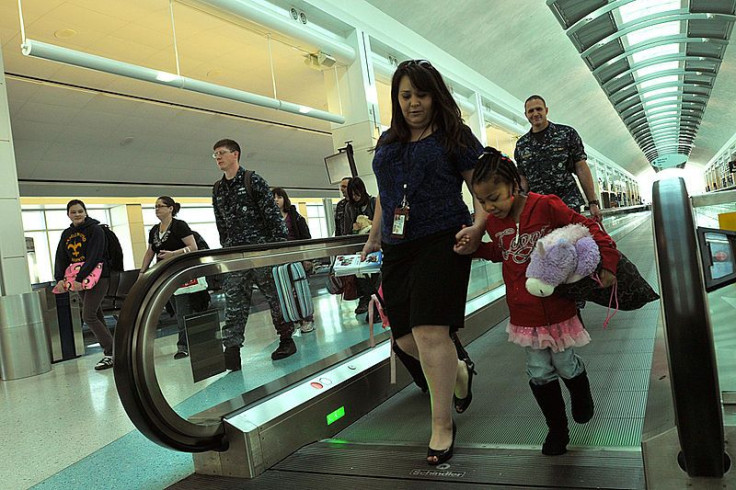Pregnancy And Flying: Risks Of Air Travel For Pregnant Women

Sporting a baby bump this summer doesn't mean you have to cancel your travel plans, especially if you've already booked a vacation overseas. Airlines for America (A4A) reports that more people will fly this summer than a year ago, with a breaking record number of people flying internationally. Between the months of June and August, airlines are expected to see the highest volume of American travelers since the summer of 2008, before the Great Recession hit the nation, predicts A4A. While the summer months invite warm weather, outdoor activity, and family vacations, pregnant women should always take extra precautions with their baby, especially if they plan to travel.
"Occasional air travel during pregnancy is generally considered safe in the absence of medical or obstetrical complications of pregnancy," said Dr. Diane Ashton, Deputy Medical Director at the March of Dimes, to Medical Daily. However, the length of an international flight might affect a pregnant woman's ability to travel. Ashton confirmed that most airline carriers will allow travel up to 36 weeks, and some will restrict women from longer international flights earlier in pregnancy. The restriction of long international flights for women who are after 32 weeks is largely in part due to access of medical care based on the country being visited. Women who have a history of medical or obstetric conditions that could be affected by flying or that could require emergency care are advised to not do air travel under any conditions.
In a study published in the American Journal of Obstetrics and Gynecology, researchers examined the physiological reactions of 10 healthy pregnant women and their fetuses during commercial flights. Each pregnant woman undertook two flights, during 32 to 38 weeks of gestation, also known as pregnancy. Researchers monitored the mothers' respiratory and heart rates, oxygen, blood pressure, uterine activity, and fetal beat-to-beat heart rate. The results of the study showed that all health factors analyzed remained within a normal range, especially the fetal heart rate. This study indicates that there are no significant in-flight health hazards to mothers and their fetuses with regard to the circulatory and respiratory system in a healthy pregnancy.
While flying can be seen as a means of relaxing with the family during the summer months, it can also be detrimental to you and your baby's health if not taken seriously. "Travel can stress a pregnant woman and late on the pregnancy can put her at risk for delivering in a "foreign" environment," Elizabeth Chabner Thompson, M.D., MPH, a radiation oncologist with training in obstetrics and gynecology, said to Medical Daily. "There are infectious disease risks when traveling overseas." The exposure to overseas diseases is not the only health risk expectant mothers should watch out for, as radiation levels are also present at airports and in-flights.
The Safest Time To Fly When Pregnant
During your first and last trimester, it is important to keep your feet on the ground. The safest and best time to fly when pregnant is during the second trimester. During the second trimester, most mothers will not have morning sickness or be as physically fatigued as they originally were during the first trimester. The Centers For Disease Control and Prevention (CDC) says that the second trimester is when a woman feels best and is in less danger of having a miscarriage or going into premature labor.
Tip: Check with your individual airline carrier for specific regulations or restrictions regarding air travel during pregnancy.
Radiation Exposure At The Airport and In-Flight When Pregnant
Pregnant women traveling by air will expose themselves and their fetus to airport security radiation. While no link has been found between airport security radiation and an increase in the adverse outcomes of an unborn child, it is still best to take necessary precautions.
Tip: Pregnant passengers can opt for a hand or wand search instead of exposing themselves to the radiation of airport security machines.
In-flight radiation exposure is inevitable due to the high altitudes that planes reach, such as 30,000 feet, which has a limited amount of radiation exposure for a short period of time, says the Health Physics Society. The noise, vibration, and cosmic radiation present a negligible risk for a frequent pregnant flyer. According to the National Council on Radiation Protection and Measurements and the International Commission on Radiological Protection, the recommended radiation exposure limit is 1 millisievert (100 rem) over the course of a 40-week pregnancy. Anything that exceeds this could put your newborn in danger of developing childhood cancers.
While there are no ways to shield yourself from in-flight radiation, there is a computer software program available to the public, called CARI-6, developed by the Federal Aviation Administration to provide an estimated equivalent radiation dose for flights.
Tips For Choosing A Flight When Pregnant
If you are pregnant and plan to travel this summer, it is important to ensure that you and your fetus have a safe trip. Ashton recommends the following for pregnant women during flights:
- book an aisle seat to allow easy opportunities to stretch and walk around
- wear a seat belt at all times and position it low, across the hips and under the abdomen
- avoid carbonated drinks and gas-producing foods before a flight
- if prone to nausea, ask a medial professional to prescribe anti-nausea medication



























